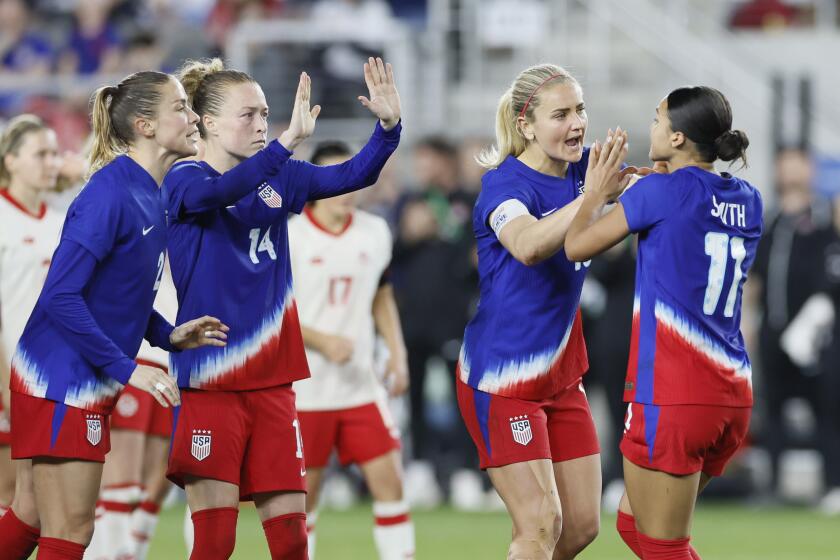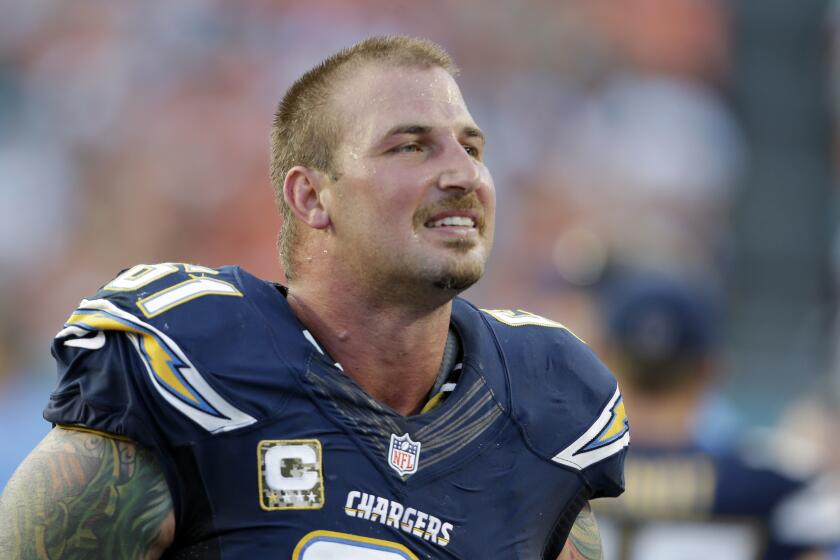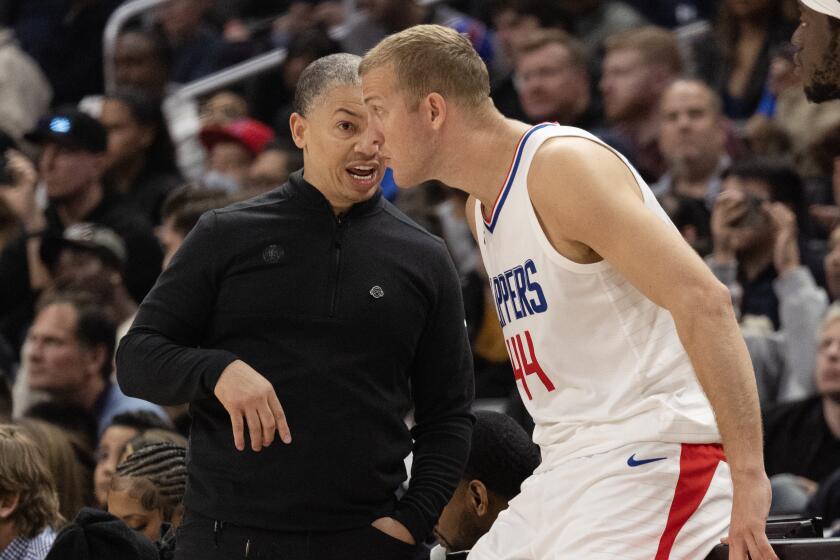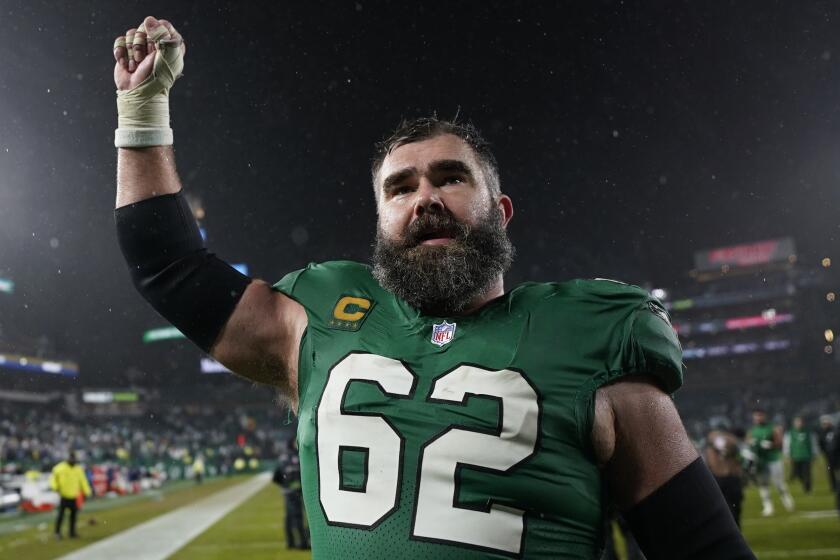Bankruptcy judge clears way for $150-million loan to Dodgers
Reporting from Delaware and Los Angeles -- A Delaware judge has cleared the way for Frank McCourt to borrow $150 million from a hedge fund to cover his looming bills, keeping the embattled Dodgers owner in charge for now — and leaving Major League Baseball on the sidelines to figure out how to resolve the club’s tangled ownership issues.
The ruling Tuesday sets up a showdown in court July 20, when the league will seek to replace McCourt’s financing with its own and regain some control over the team during bankruptcy.
The decision capped a contentious day in court and competing accusations that the other side was responsible for the fabled franchise’s troubles. In the end, McCourt got his interim financing and the league staved off an auction of the Dodgers’ cable rights.
But however the bankruptcy ultimately shakes out, there’s a good chance that baseball and Los Angeles will have to contend with McCourt for a while.
After buying the Dodgers in 2004, McCourt created such a labyrinth of companies separating the team from its stadium, ticket sales, parking and other revenues that he is likely to retain some prominent presence in Chavez Ravine, sports law experts predict.
What shape that might take is unclear. Attorney Dan Grigsby, head of a national sports law group in Los Angeles, said that, among other things, McCourt appears to have kept his options open for future development at the Dodgers site by making the real estate a separate entity.
“There’s been talk for years about building a football stadium there, or building housing,” he said. “The advantages of keeping the land separate is that you can have a whole separate set of investors and lenders who will develop something without having to get entangled in the operation of the Dodgers.”
The league argues that the operations are interrelated, need to abide by league rules and should be considered as a whole in the bankruptcy proceedings.
McCourt would not be the first owner to lose a team through bankruptcy but hang on to some assets. Former Texas Rangers owner Tom Hicks also had split that franchise into various entities. When the team emerged from bankruptcy with new owners, Hicks kept the parking lots — and then sought to raise prices.
McCourt’s restructuring of Dodger businesses began not long after he and his then-wife, Jamie, with whom he has been locked in a bitter divorce focused largely on the team’s ownership, moved to Los Angeles seven years ago.
In 2004, McCourt paid $330 million for the Dodgers and $100 million for the stadium and 250 acres surrounding it, including the parking lots, according to the bankruptcy filing. He used 24 acres of Boston property as collateral on a $145-million loan from then-owner Fox Entertainment Group and financed the rest of the purchase with other borrowings. Two years later, Fox took the Boston land as repayment.
The complicated structure of Dodger entities is spelled out in a bankruptcy filing that takes most of a page just to list them all and their relationships to each other. When the league took over the Dodgers’ finances in April, its trustee found 26 interlocking entities.
McCourt’s bankruptcy filing casts the team’s financial difficulties as being caused by “a perfect storm of events,” including the league’s requirement that the team pay 10% of its income for the baseball empire’s revenue sharing, slumping ticket sales last year due to the team’s failure to make the playoffs and $22 million paid for deferred compensation.
The Dodgers’ financial statements aren’t publicly available, but it was disclosed last year that the team had $525 million in debt when the league vetoed McCourt’s efforts to borrow an additional $200 million. That was up from $433 million a year earlier, according to The Times’ analysis.
The league contends that the Dodgers are far over its debt limit.
McCourt was able to secure emergency financing from a hedge fund controlled by JPMorgan Chase, but at a 10% interest rate and a $4.5-million fee. The league has offered to lend the team the money it needs at 7% without a fee, staving off McCourt’s planned auction of broadcast rights when he may be too motivated to sell.
League lawyer Thomas Lauria said it was pleased to have won postponement of the rights auction “without writing a check for $150 million.”
Dodgers lawyer Bruce Bennett said McCourt remains opposed to the league’s financing because it could give the league “excessive influence” over the team’s fate in the bankruptcy proceedings.
McCourt appears to be gambling that U.S. Bankruptcy Court Judge Kevin Gross will accept his argument that a lucrative long-term broadcast deal would lead to solvency and pay off creditors. McCourt had such a deal with Fox Sports, but the league did not approve the agreement.
McCourt’s divorce agreement with Jamie fell apart after the league vetoed the Fox deal, which would have paid nearly half of that amount to Jamie, to the couple’s lawyers and for their own living expenses.
For years, the McCourts used the Dodgers as their personal credit card, loading the franchise with debt and mixing its finances with their own. By various accountings, they took out more than $100 million in salaries and other distributions from the business, lavishing much of it on themselves.
Even in a city known for conspicuous consumption, the McCourts stood out for their ostentation— much of it on the team’s tab.
“In pursuing his own financial interests at the expense of the club, overleveraging it and draining millions of dollars for capital investment and operations, Mr. McCourt has placed” the Dodgers “in their current, incredible position of not being able to make payroll less than halfway through the regular season,” the league stated in court documents Tuesday.
Some legal experts predict that McCourt will prevail, at least in the short term, in holding on to control of the team as well as the services he leases back to the Dodgers.
Under bankruptcy rules, McCourt has exclusive rights for 120 days to put together a restructuring plan.
G. Marcus Cole, a Stanford University professor of bankruptcy law, predicted that the league will have no role in operating the team during that period. Not only will its trustee, Tom Schieffer, be required to relinquish day-to-day control of the team, Cole said, but the league could be held partially responsible for the team’s financial difficulties for usurping control.
“Why should Major League Baseball be able to just walk into the corporate offices and take over when Manny Ramirez and other creditors can’t?” Cole said, noting that the Dodgers’ former slugger is actually its biggest creditor, not the league. He compared Schieffer’s arrival to the head of a union taking charge of an insolvent company on the grounds that its interests were at risk.
Los Angeles Times staff writer Bill Shaikin contributed to this report.
More to Read
Get our high school sports newsletter
Prep Rally is devoted to the SoCal high school sports experience, bringing you scores, stories and a behind-the-scenes look at what makes prep sports so popular.
You may occasionally receive promotional content from the Los Angeles Times.








